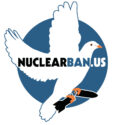This page will continue to be updated with answers to questions you may have about the campaign. Most of the questions will link you to a page which already answers that question.
What treaty are you talking about?
Who has and has not signed the Treaty?
What does 'Treaty Alignment' entail?
Which countries have nuclear weapons?
Do nuclear weapons deter nuclear attacks from other countries?
There is no evidence that nuclear weapons protect us from other countries. If, say, North Korea were to develop missiles capable of attacking the USA with nuclear warheads (they haven’t yet, but they’re working on it), it might seem like a good idea to wipe out their nuclear arsenal first so they can’t get us.
But there’s a problem: they already have the warheads, even if they don’t have the missiles that can deliver them. We can’t wipe out their nuclear arsenal with conventional (non-nuclear) bombs. They’re spread out far and wide and they keep moving around.
Spreading them out and moving them around is standard practice for nuclear nations. The USA, for example, has a “Triad” of nuclear weapons that can be launched from aircraft, from submarines, and from ground silos scattered over very wide distances. North Korea has them hidden under mountains, and moving around on trucks through secret subterranean roadways.
So to wipe out North Korea’s nuclear weapons, we’d have to use our own nuclear weapons, and we’d have to wipe out the entire country. Meanwhile, they’d see our missiles coming, and they would have seven minutes they would launch a retaliatory attack. Some of their nuclear weapons would get through, at least as far as our friends South Korea or Japan, or our territory Guam.
In addition to the millions of innocent North Korean civilians we would slaughter, the radioactive fallout would spread across the whole world, including the US. The explosions could raise enough soot to cause climate disaster and mass global starvation. And, having committed genocide, the USA would lose whatever moral authority it might currently enjoy.
So if we fire first, we get attacked in return. If we fire second, well, it’s too late, we’ve already been attacked.
How much do nuclear weapons cost?
What would happen if the USA made the first move to get rid of its nuclear weapons? Wouldn’t we be vulnerable?
The USA doesn’t have to disarm first to make that happen. It only has to PLEDGE to disarm, and work out a verifiable, time-bound disarmament plan with the other nuclear countries. The 2017 United Nations Treaty on the Prohibition of Nuclear Weapons spells out the steps to take.
Do nuclear weapons stop conventional weapons or invasions?
Nuclear weapons, by their nature, can’t defend a country from being attacked. They are massive, and thus can’t be used against tanks, ships, airplanes, submarines, or armies without inflicting indiscriminate, widespread, permanent damage.
Is it safe to keep nuclear weapons around if we’re not going to fire them?
And of course there’s always the possibility of a mechanical malfunction or accident leading to detonation of a nuclear weapon – as long as there are machines, there will be accidents, and this is all too common. For example, there are 50 nuclear weapons at the bottom of the sea – that we know of. They sank with submarines, or fell out of airplanes, or rolled off ships.
Do nuclear weapons protect us from terrorists?
However, the entire world is living with the terror of nuclear weapons that can harm people halfway around the planet from where a nuclear conflict is occurring. So it could be accurately said that the existence of nuclear weapons is inflicting terror, affecting the psyches of human beings everywhere every day, with no useful result.
How powerful are today’s nuclear weapons?
Now imagine that that is equal to one drop of water.
The lowest possible estimate of the USA’s nuclear arsenal today is about 400,000 KT, or 26,000 Hiroshimas. If one drop of water is one Hiroshima, the USA’s current arsenal is about a gallon and a half.
Or if one Hiroshima equals one step, the USA’s current arsenal is, at the very least, a 13-mile hike.
Russia has a similar amount. The global total is about 15,000 nuclear warheads.
So don’t be fooled by propaganda about “reductions” or “freezes.”
If it’s so dangerous, why are we still alive?
What about paying taxes? Isn’t that complicit with the nuclear weapons industry too?
A small number of very dedicated ‘war tax resisters’ refuse to pay this tax (or choose to live below the taxable level to avoid paying it). However, for most of us, that is not a viable option and is, in any case, illegal. For the purposes of complying with the Nuclear Ban Treaty, our legally required taxes are considered part of what lies ‘outside our jurisdiction or control’ and therefore we are not addressing that right now.
What about jobs, and the economy?
Good news: there will be plenty of jobs dismantling nuclear weapons, using many of the same skills currently in use for nuclear weapons construction and maintenance.
More good news: federal funding can be shifted toward sustainable technologies that address climate change, and many of the same resources and workers can readily be converted.
The facts: Companies that produce nuclear weapons or parts for nuclear weapons will need to produce other products. Companies and contractors that supply those companies will need to find other customers. The workers in those companies will need to be re-skilled and re-deployed. Banks, pension funds, private investors, and financial institutions will need to shift their funds into non-nuclear weapons activities. Communities that rely on federal funding for nuclear weapons industries will need to find other sources of income.
What does the Pope say?
–Pope Francis, 10 November 2017, message to the United Nations Conference to Negotiate a Legally Binding Instrument to Prohibit Nuclear Weapons, 27 March 2017
What does the Dalai Lama say?
–His Holiness the 14th Dalai Lama, ICAN website
